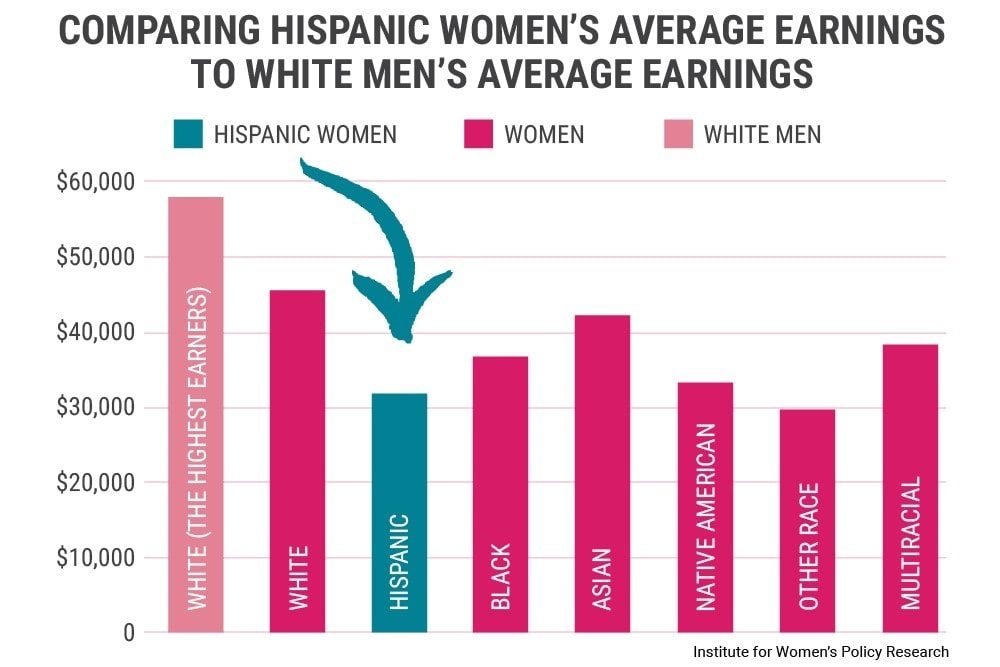
Latina Equal Pay Day 2018
Guest Interview: Latina Equal Pay Day
November 1 is Latina Equal Pay Day, the extra 10 months and one day Latinas have to work into 2018 to earn as much money as white men (the highest earners) made in 2017 alone. WFCO interviewed Nancy Hernandez, Ph.D., about the impact of the pay inequity on Latinas and the state. Nancy is an equity specialist at the Western Educational Equity Assistance Center and the board chair of the Chinook Fund. 
Latinas in Colorado earn 54 percent of what their white male counterparts earn – what does this mean for our state’s economy?
It means that Latinas who bear the heavier responsibility of raising children and caring for families are at a disadvantage in our state. It means our economy is not thriving because we are not thriving. It means that Latinas must make sacrifices to care for their children and families, which often includes aging parents and elders. We make those sacrifices because family is important to us. In doing so, we forego critical things like healthcare, quality time with our loved ones, and helpful resources like supplemental education, health services, better housing, and more nutritious food.
Ultimately, what hurts us hurts the state. Having a significant portion of our state’s population in a situation where they must work twice as hard to get the bare minimum brings down our entire economy. Imagine what it would be like if Latinas had the same earnings as white men! We could afford the same high quality health care, after school programs, and stress-reducing and enriching activities that more privileged families can access. Imagine the gains to our children and to our future if that were the case!
Having a significant portion of our state’s population in a situation where they must work twice as hard to get the bare minimum brings down our entire economy.
But, rather than being rewarded for our efficiency, creativity, and generosity and for willingly sacrificing self-care for our families and for making do with less – instead of getting more support to remedy this economic inequity – we are punished with bigoted and hateful speech about who we are, what we stand for, and our value in this society. At this very moment, the federal government is proposing changes to the Public Charge rule that would penalize immigrant families (including thousands of Latinas) who use food stamps, Section 8 housing, and who lack private insurance or good credit scores by making it impossible for them to gain permanent residency. We are threatened with even fewer resources and forced to make sacrifices that are more terrible.
Right now, Latinas face dehumanization; deportation; long-term incarceration; separation from children and families; diminished access to health care and support services, ALONG with unequal wages. There has never been a better time for Colorado to reflect on how much Latinas contribute to our economy. We could work to make our pay and our safety, security, and well-being more equitable. We could speak up to reject laws and policies that target and harm Latinas and that further turn us into second-class citizens. We need everyone to protect basic human rights. We need everyone to recognize that significant portions of our state’s wealth is built and maintained on the backs of Latinas and other undervalued women.
What systemic barriers have contributed to this gender and racial pay gap?
We see all the barriers on the news every single day. Racism. Sexism. Homophobia. Classism. Anti-immigrant sentiment. Violence. The intersections of all these and more are present everywhere. Every step we took toward a more equitable society is being systematically erased and reversed.
We need our allies to stand up and say: Not this time. Not in this state.
Let’s be real: Women’s work has always been valued less. People of color’s work has always been valued less. As Latinas, the message we get is that our lives are valued less. We repeatedly hear that for others to get ahead, others have to be sacrificed. We are told that this is why we cannot have equal wages and why we cannot have more resources. And by today’s standards, not only are we valued less, we also need to be erased. To be a Latina right now is to feel the hatred and viciousness of those who seek to dehumanize and erase us. It is systemic. It is historical. It is pervasive. It is not the first time Latinas have been targeted for these attacks. It likely will not be the last time. We need our allies to stand up and say “Not this time. Not in this state.”
What does this inequity in earnings amount to over a Latina’s lifetime?
The inequity is about more than income. It is about lack of social justice over the course of a person’s life. If a woman has to work harder to earn what her male counterpart earns, it means she has less time to nurture herself and her family. It means less time passing on valuable life lessons, culture, and habits. It means less time participating in her community, with her family, in causes that are important to her, in civic life, including voting and education.
It means a reduced opportunity to live a healthy, robust life and increases in stress and risks to major illnesses. It means diminished equity all around – not just in terms of income, but also in opportunities to build healthy communities and a more just society. To top it all off, we are still told that Latinas’ lack of participation is due to our lack of interest and our lack of caring. How can we care and participate when we must spend more of our time making up for unequal earnings and in fighting injustice? How can we participate when our very safety is threatened and when some of our children and families live in terror of separation? How can we care and participate in a society that so blatantly and systematically devalues us?
And yet, every single day, you will see Latinas going out to work across Colorado. In spite of how we are treated and in spite of the gross inequity in pay, we are out there cleaning the homes, bathrooms, and hotel rooms of people who think we are less. We are out there preparing food, taking care of children, educating them, and even taking care of others’ parents while we ourselves cannot afford to do this for our own families. We make less money than those who benefit from our labor without equal compensation. If we disappear, what then? Yes, it is detrimental to us. But it is also detrimental to everyone.
To make a comment about the changes to Public Charge, visit this page.
To make a comment on the indefinite detention of immigrant families and detained children and proposed termination of children’s protections while in detention (known as the Flores Agreement), visit this page.
The Women’s Foundation of Colorado is a nonpartisan organization. The opinions of guest bloggers are their own and do not necessarily reflect the opinions or positions of The Foundation.

